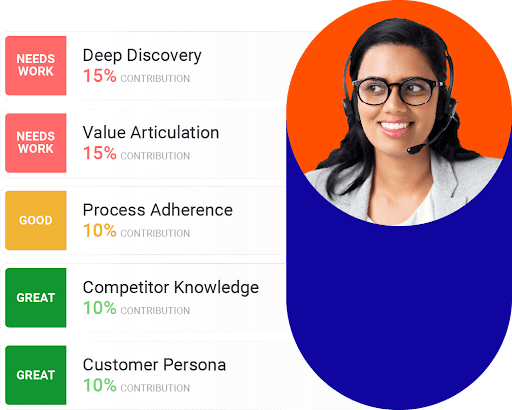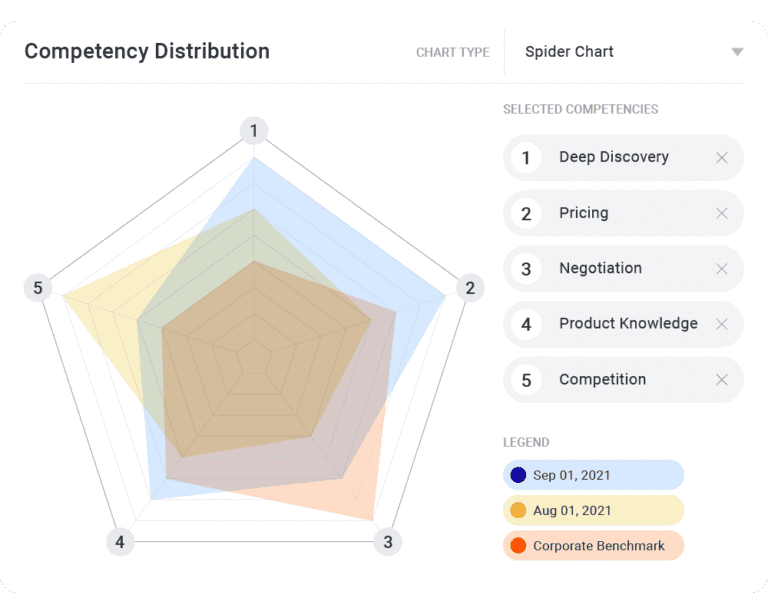Like the best athletes, the best sales reps always ask for and get more coaching from their managers.
The best managers are coaching their reps a lot more too.
According to our 2024 State of Sales Productivity Report, top managers tripled the number of coaching sessions since 2022, completing 40 sessions per month. Top-performing reps also get four more coaching sessions per month.
The result?
More wins. More revenue.
So where do you start?
Key takeways
- The best managers are doing something differently with their reps during coaching sessions.
- There are three common types of coaching between managers and reps. We break them down.
- Next steps for setting up an efficient, personalized, and scalable coaching program at your own org.
Coaching must go beyond deal reviews
Creating a “coaching culture” is often identified as a priority for selling orgs. We define a coaching culture as ongoing, data-driven, and infused into every manager and seller interaction.
When done well, it works.
According to research, companies with dynamic coaching programs achieve 28 percent higher win rates.
Companies with dynamic coaching programs achieve
Unfortunately, many orgs struggle to create this coaching culture and instead take an ad hoc approach focused on short-term fixes. This approach is almost always primarily focused on deal reviews.
Of course, as-needed deal reviews are an important way to improve the outcome of a given sale. But on its own, deal coaching isn’t enough to improve long-term results.
The best sales orgs take a different approach to coaching. Rather than focusing solely on deal coaching, they deliver a blend of coaching types delivered at regular intervals to improve long-term success.
How the best sales managers are coaching their reps
Back to the best athletes: When they’re asking for coaching, it’s usually to address a specific issue with their game.
The same can be said for sales reps.
However many orgs struggle to identify rep weaknesses, which makes effective coaching a struggle.
According to our 2024 Chief Revenue Officer and Sales Leader Outlook Report, only 40% of C-level executives said they can identify rep strengths and weaknesses.
The first step to effective coaching is to understand rep strengths and weaknesses. To do this, you can take a look at your win/loss reports as well as call recordings to get a better understanding of where reps need improvement. From there, you can equip managers with what they need to “fix” those issues and get your reps back into the field with the skills they need to close more deals,
Let’s take a closer look at the three types of coaching the best sales managers are delivering to reps — and how often they’re doing so.
#1 Opportunity sales coaching
When someone hears the phrase “sales coaching,” their mind might immediately go to opportunity coaching. That’s not surprising, as it’s the most common type of sales coaching. Our research found that 85% of sales reps report being coached on open deals.
Opportunity coaching is an important way to improve the outcome of a deal. For example, a sales manager might identify that something in a deal isn’t going as planned. This might be based on feedback from the rep during a pipeline review meeting. Or, they could get insight by leveraging a conversation intelligence solution that sheds light on how the rep is performing.

In either circumstance, the manager can provide opportunity coaching to help the rep steer the deal back on course. And this will improve the chances of them ultimately closing the deal.
How often are the best managers delivering opportunity coaching? Sometimes, this coaching happens at a regular cadence — for example, during a weekly pipeline review. At these meetings, reps and managers discuss current opportunities — and how to move them forward.
Often, though, opportunity is delivered as needed — for example, when a rep raises a question or concern or meeting intelligence uncovers an issue.
#2 Skills sales coaching
In general, skills coaching is a lot less common. A mere 24% of reps report being coached on skills.
While opportunity coaching improves the outcome of a single deal, skills coaching is required to ensure reps have the skills and behaviors needed to close deals consistently.
The best sales managers recognize the importance of skills coaching on long-term behavior. As such, they aim to deliver at least one skill-based coaching session per month per rep.
What skills do they focus on? The short answer is, it depends. The first step is for organizations to identify the knowledge, skills, and behaviors a rep needs for success by developing an ideal rep profile (IRP).

Then, each rep should be measured against this gold standard. This helps managers identify where there are skills gaps. Armed with this data, sales managers can deliver targeted, personalized skills coaching that addresses the needs of each individual rep.
#3 Targeted sales coaching
If there’s one thing sellers can count on, it’s that things are always changing. New products are released. Pricing or packaging is adjusted. A new competitor enters the marketplace. And those are just a few of the many changes faced by reps.
The best sales managers deliver coaching sessions to address changes and ensure reps are equipped to adapt. Typically, targeted coaching is a single session on a specific, targeted topic — often followed by enablement content such as content, training, or a role-play exercise.
When it comes to sales coaching, follow-up is key
Sales managers are busy. But the best ones know that coaching is worth the time and effort. On average, top managers complete 12 coaching sessions per month.
But coaching isn’t a one-time event. For example, a manager can’t simply deliver a skills coaching session focused on objection handling, check it off the list, and never think about it again — at least not if they expect actual improvement.
The best managers know that proper follow-up and ongoing reinforcement are key to effective coaching. Our analysis found that top managers are three times more likely to assign content, training or a role-play as a follow-up to a coaching session.
This follow-up is paying off. Reps who are assigned follow-up actions post-coaching see an average improvement of 13 points in Sales Readiness Index scores.

Start closing gaps and optimizing seller performance with coaching
Sales coaching, when done well, is proven to boost sales outcomes significantly. Deal coaching alone won’t cut it. The best sales leaders use a blend of deal, skills, and targeted coaching to ensure the entire sales team has what it takes to close deals.
Sales Coaching in Mindtickle
Ready to see how Mindtickle can empower you to deliver personalized, effective sales coaching at scale?
Get a Personalized Demo


 By Helen Waite
By Helen Waite
 By Christian Pieper
By Christian Pieper
